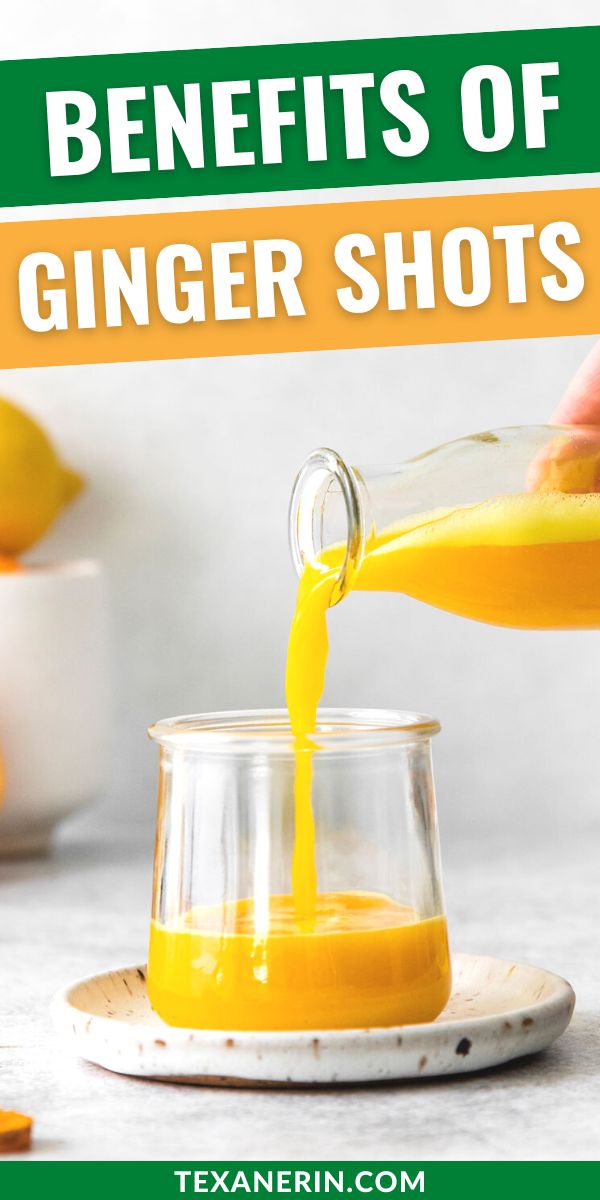The benefits of ginger shots are huge. Ginger is packed with antioxidants and anti-inflammatory properties, and an array of vitamins, minerals and micro-nutrients. You’ll give your body the boost it needs to stave off colds and much more!
First, please note that ginger can interact with blood thinners, diabetes medication, and high blood pressure medications. Do not take ginger if you have a blood disorder, and if you have gallstones, please talk to your doctor first.
I’m not a doctor, nor do I play one on the internet. Please consult with your doctor if you’re unsure whether ginger is okay for you or not!
Wellness shots and immune-boosting shots like these Turmeric Ginger Shots seem to be all the rage, and quite frankly, after diving into the benefits of ginger shots, it’s no wonder everyone is partaking.
Ginger is from southeast Asia and is an aromatic root and spice that has been used in Eastern medicine since the 9th century. Fresh or dried ginger can be used in cooking, steeped in teas, used in pill form as supplements, juiced, extracted or blended in drinks to get all those amazing health benefits.
Today, we’ll look at ginger shot benefits and how to spice up your daily routine.
8 healthful benefits of ginger
Ginger is a plump root that resembles a small gnarly tree trunk. It’s packed full of healthy compounds and provides multiple health benefits.
There are 400 naturally occurring chemical compounds identified in ginger. The main active component is gingerol which lends to its pungent taste and powerful anti-inflammatory and antioxidant properties.
1. Immune system support
Ginger contains a wide range of vitamins, including vitamin C, potassium, magnesium, B vitamins thiamine, riboflavin and niacin. Plus, it has minerals like iron, calcium and phosphorus.
In general, vitamins and minerals boost the immune system and help cell and organ functions. They’re essential for bodily functions like fighting infections, healing wounds, strengthening bones and regulating hormones.
Just take a look at some of the vitamins and minerals found in ginger:
- Vitamin C is important for metabolic processes like — antioxidant function, iron absorption, producing neurotransmitters (brain chemicals) and building the immune system to fight infections.
- B vitamins help fuel the body and break down energy-yielding nutrients like carbohydrates, fat and protein.
- Calcium helps strengthen bones and teeth and regulates muscle and heart function.
- Magnesium has many functions, including bone health and using glucose for energy. Plus, it helps support immune function and regulates blood pressure and lung function.
- Potassium is good for the nerves, muscles and heart and keeps them working properly. It’s also known to lower blood pressure.
And we’re just getting started.
2. Antioxidant properties
The word antioxidant describes a range of substances that can prevent or slow damage to cells caused by free radicals. Free radicals are waste substances produced by cells. When they overwhelm the body’s ability to regulate them, a condition known as oxidative stress ensues.
If the body cannot process and remove these free radicals, it can trigger a number of diseases.
Antioxidants help neutralize free radicals and improve overall health.
Each antioxidant serves different functions, which is why it is important to diversify your diet.
Ginger is loaded with antioxidants to help fight off chronic diseases like high blood pressure, lung diseases and heart disease.
Due to both antioxidant and anti-inflammatory properties, ginger also has anti-carcinogenic properties that can help reduce the risk of some cancers.
Examples of antioxidants found in ginger are vitamin C, gingerol, flavonoids and phenolic acids.
Overall, ginger provides good antioxidant support, especially fresh ginger.

3. Anti-inflammatory properties
Ginger, given its antioxidant properties, may also have anti-inflammatory qualities that intercept elements in the development of multiple sclerosis and neurological diseases, including Parkinson’s, Alzheimer’s, migraine, and epilepsy.
These anti-inflammatory properties also help manage the pain of arthritis. So the antioxidants found in ginger; gingerol, and parasols also have anti-inflammatory properties.
“Research shows that ginger affects certain inflammatory processes at a cellular level,” says the study’s lead author, Roy Altman, MD, now at the University of California, Los Angeles.In fact, ginger’s anti-inflammatory properties reduce inflammation by blocking the genes needed to create inflammation in the first place.
Ginger also boosts brain function by increasing serotonin and dopamine levels which can lead to reduced inflammation.
4. Pain relief
Some studies have shown that ginger may offer pain relief comparable to ibuprofen. And it may also help to reduce muscular pain.
Other studies have shown that consuming raw or heated ginger after an injury significantly reduced pain.
The daily dose of ginger is up to 4 grams to help manage arthritis symptoms.
However, always speak to a health professional before introducing ginger because there are risks of interactions with medications like blood thinners.
5. Supports heart health
Cardiovascular disease, including coronary artery disease and stroke, is one of the leading causes of death worldwide.
Several studies have described how ginger can control or improve some cardiovascular risk factors like cholesterol levels and hypertension.
Other studies showed ginger contains anti-inflammatory properties that work much like non-steroidal anti-inflammatory drugs (NSAIDs). So like we said above, ginger reduces inflammation by blocking the genes that create the inflammation.
Also, researchers concluded that ginger might help to lower cholesterol and prevent blood clots by acting like a thinner. The agent responsible is gingerols, which help to prevent abnormal blood coagulation and thus are heart healthy.
6. Improves digestion and relieves nausea
Eating ginger promotes digestion, so the food doesn’t sit in your gut long.
It also helps relieve nausea in cases of car sickness, chemotherapy and pregnancy. Ginger has been reported to ease nausea post-chemotherapy without the side effects of medications.
As for morning sickness, ginger is an acceptable nonpharmaceutical remedy for nausea and vomiting.
It even helps with bloating and gas. Eating ginger helps reduce fermentation, constipation and intestinal gas.
Plus, it’s anti-ulcer! Ginger has been reported to exert anti-ulcer, anti-tumor, digestive and gastro-protective activities.
7. Anti-bacterial
Interestingly, studies have shown that ginger has direct antibacterial activity and can be used to treat various bacterial infections.
In studies, ginger played a vital role in the prevention of microbial growth and acts as an anti-microbial agent. This activity helped against E Coli and Salmonella.
8. Improves blood sugar regulation
Ginger seems to show a pivotal role in the control of diabetes and its complications through the anti-hyperglycemic effect.
How it does this is not yet fully understood, but it’s thought it might be due to the inhibition of oxidative stress and anti-inflammatory process.
The study reported ginger juice’s significant blood glucose-lowering effect in test animals.
So ginger can be an effective addition to your diet to help lower blood sugar levels and regulate insulin production.
Eating up to 4 grams per day is safe, but always remember to speak to a medical practitioner before introducing new foods that may interfere with other medications.
Additional benefits of ginger shots
Ginger shots don’t contain just ginger.
Here are the other typical ingredients you find in ginger shots:
- Lemons are a great source of vitamin C and have some iron, which can help support overall health. The iron in lemons can also help prevent anemia by improving iron absorption from plant foods, and it also supports heart and digestive health.
- Oranges have high levels of vitamin C, are packed full of fiber, and are high in antioxidants and micronutrients.
Oranges are a good source of potassium, which supports heart function, and others minerals act like a natural diuretic that can reduce blood pressure, prevent bone loss, and protect against heart disease.
Oranges also have folate, which helps to support the brain and nervous system, and oranges have smaller amounts of calcium, magnesium, and vitamins A and B. - Turmeric is rich in vitamin C, B6, and manganese and has been used for centuries as an anti-inflammatory, and it’s also known for its antioxidant properties.
Turmeric’s active ingredient is curcumin, which gives turmeric its yellow color. It’s also is high in iron, potassium and Omega-3 fatty acids. - Black pepper has an active ingredient, piperine, which is said to aid the absorption of turmeric by 2000%! It, too, is high in antioxidants and has anti-inflammatory properties, and it’s good for digestion.
Studies show that turmeric’s health benefits are enhanced by taking it together with black pepper.

How to use ginger?
Ginger has many different types and comes in many forms: fresh, dried, pickled, preserved, powdered, as an extract or supplement. It also can be candied or crystallized as well as juiced.
With all these options, you can see how easy it is to introduce it into your daily diet.
The chemical makeup of ginger differs depending on whether you use dried chunks, powdered or fresh ginger.
Ginger undergoes nutrient and phytochemical changes when it’s dried. This doesn’t mean that it doesn’t have benefits; it’s just different.
Both fresh and dried ginger has plenty of benefits, so consume it however you can get it.
Can I consume ginger every day?
Yes, it is safe to consume up to 4 grams per day for most people, but note that you should always consult your physician before introducing new ingredients into your diet, especially if consumed with other medications. For pregnant women, most experts agree that up to 1 gram of fresh ginger root per day is okay.
So whether you’re shooting down ginger shots, adding ginger to smoothies or drinking ginger juice, you can be confident, you’re getting potent, healthy, natural support to your immune system.
Ginger recipes
If you’re looking for some recipes with ginger, you might try some of my favorites below.
- Pepparkakor Recipe (Swedish Ginger Cookies)
- Chewy Paleo Ginger Cookies
- Strawberry Ginger Banana Smoothie (Anti-nausea Smoothie)
- Ginger Berry Popsicles
- Ina Garten’s Ginger Cookies
- Blueberry Ginger Jam
Now that you know all the benefits of ginger shots, I hope I’ve convinced you to try them! If you have any questions, please comment below, and I’ll be happy to answer. :) Thanks!
Sources:
- https://www.ncbi.nlm.nih.gov/pmc/articles/PMC3665023/
- https://pubmed.ncbi.nlm.nih.gov/9619120/
- https://www.ncbi.nlm.nih.gov/pmc/articles/PMC4106649/
- https://www.hopkinsmedicine.org/health/wellness-and-prevention/ginger-benefits
- https://www.dovepress.com/the-antimicrobial-efficacy-against-selective-oral-microbes-antioxidant-peer-reviewed-fulltext-article-IDR#
- https://www.hindawi.com/journals/ecam/2011/249487/
- https://www.health.harvard.edu/heart-health/key-minerals-to-help-control-blood-pressure







There are no responses on “Benefits of Ginger Shots” — Be the first one!